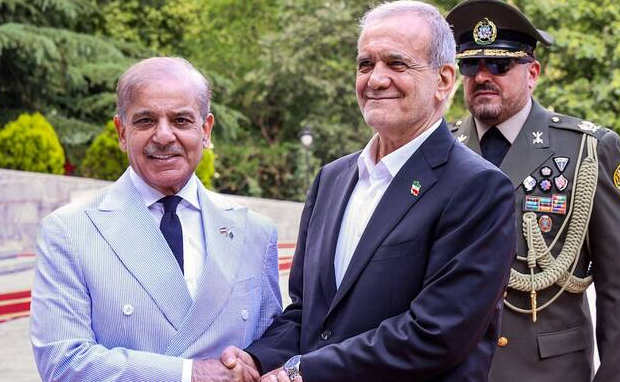ISLAMABAD — Iranian President Masoud Pezeshkian is set to land in Islamabad on Saturday for a two-day official visit that signals Tehran’s intention to deepen ties with Pakistan amid shifting regional dynamics. This marks Pezeshkian’s first state trip to Pakistan since taking office.
Invited by Prime Minister Shehbaz Sharif, the Iranian leader will be accompanied by a high-ranking delegation, including Foreign Minister Seyyed Abbas Araghchi and several senior cabinet members.
High-Level Talks and Regional Coordination on the Agenda
During his stay, President Pezeshkian is scheduled to hold formal talks with Prime Minister Sharif and also meet with President Asif Ali Zardari. According to Iranian political adviser Mehdi Sanai, discussions will span trade, border security, regional cooperation, and cultural exchanges.
One of the central goals of this visit is to push economic cooperation beyond the current $3 billion trade volume, with both sides eyeing improved provincial and border coordination—especially critical given recent cross-border tensions and the need for greater stability along the shared frontier.
Diplomatic Continuity Amid Political Change
This visit follows a pattern of high-level engagements between the two neighbors. Pezeshkian’s predecessor, Ebrahim Raisi, visited Islamabad in April 2024—just weeks before his untimely death in a helicopter crash. That trip laid the groundwork for a number of trade and energy-related discussions that may now be revisited under new leadership.
Earlier this year, in May, Prime Minister Sharif traveled to Tehran as part of a regional outreach initiative during heightened tensions with India. He met with Iran’s Supreme Leader Ayatollah Khamenei and President Raisi at the time, focusing on strategic cooperation in trade and regional peace efforts, particularly regarding Gaza.
A Reset in Bilateral Ties?
While Iran and Pakistan share deep religious, historical, and cultural ties, their relationship has often been complicated by regional rivalries and security concerns. However, Pezeshkian’s visit could mark the beginning of a more pragmatic chapter—centered on economic interdependence and coordinated regional diplomacy.
Analysts say the visit also gives Pezeshkian an opportunity to assert his foreign policy approach early in his presidency, signaling continuity with Raisi’s regional outreach but with potential for a more moderate and economically driven agenda.
If successful, this trip could help both countries navigate a volatile neighborhood through stronger bilateral mechanisms and shared economic interests.

